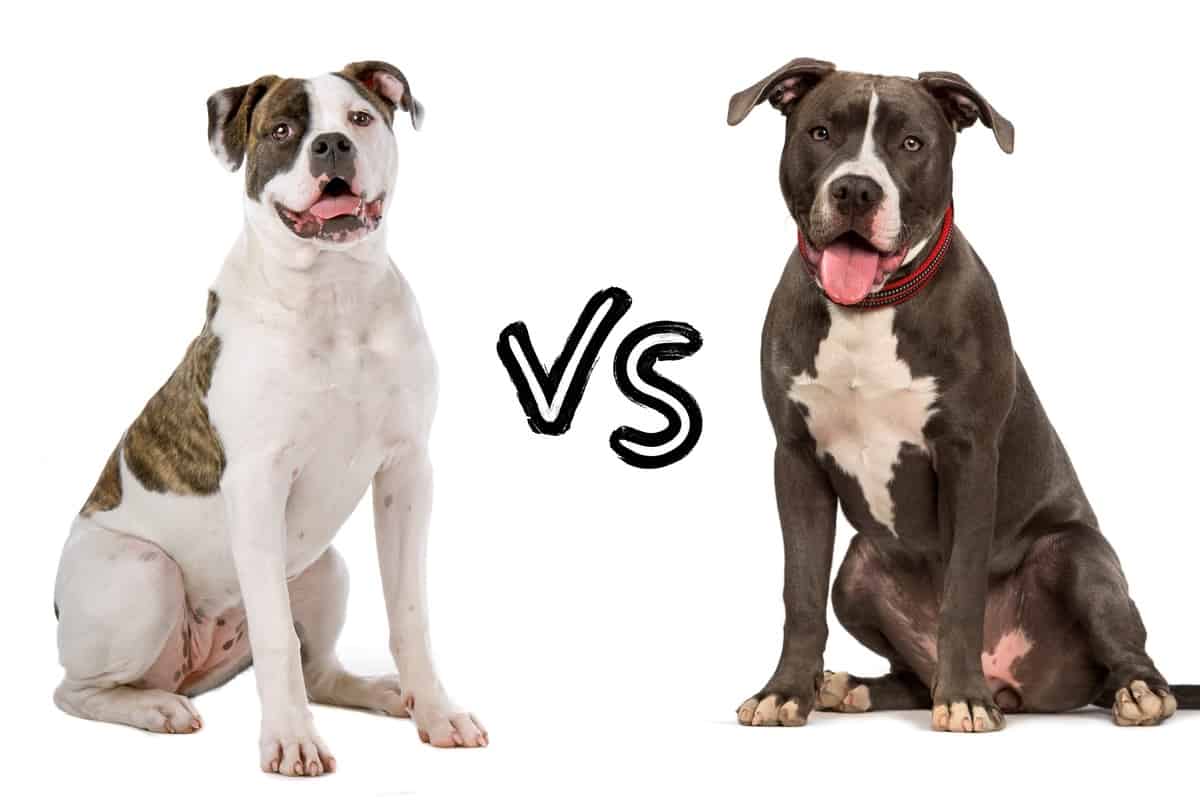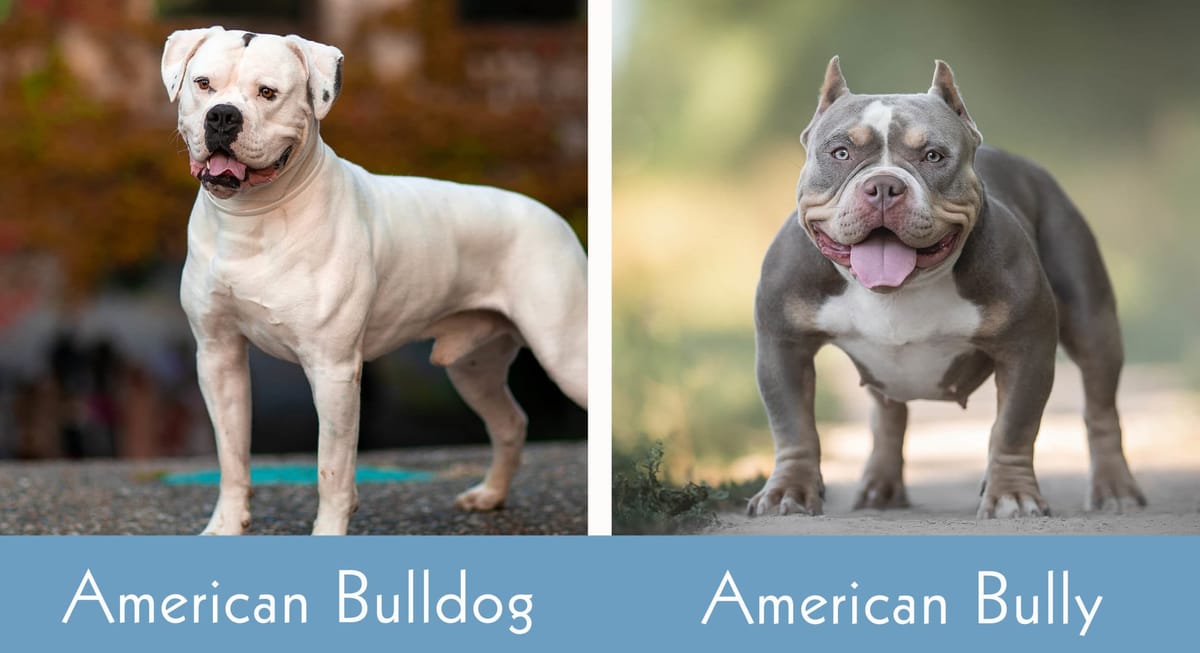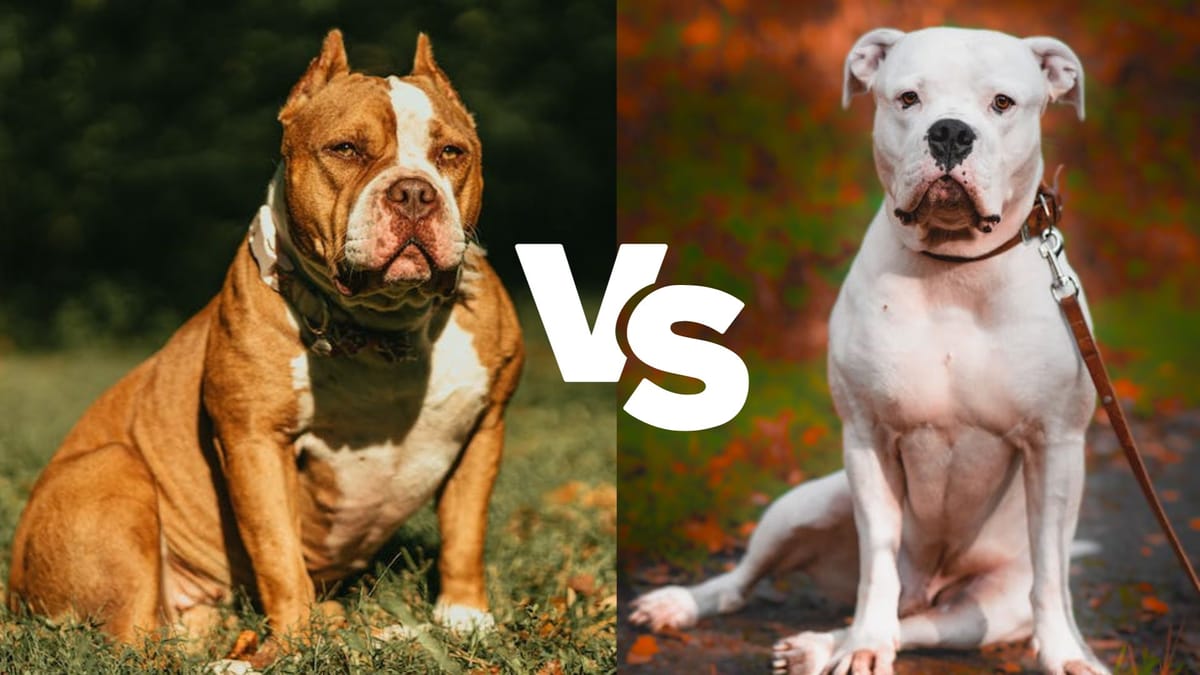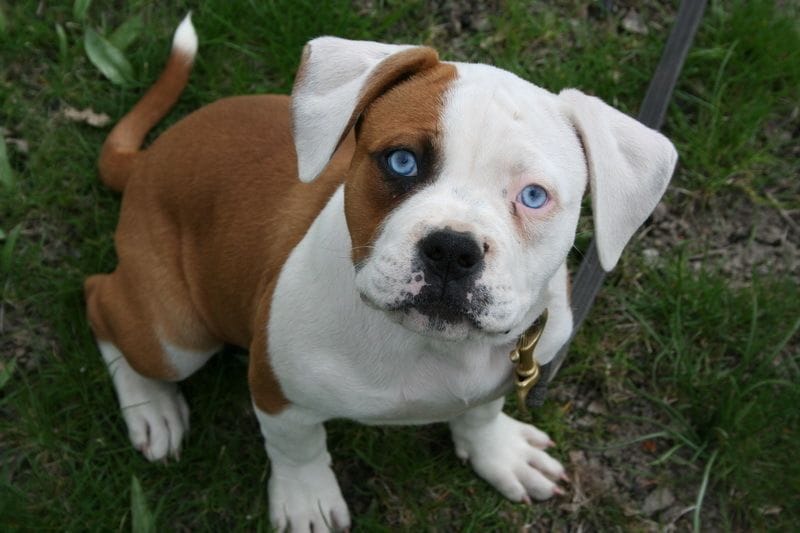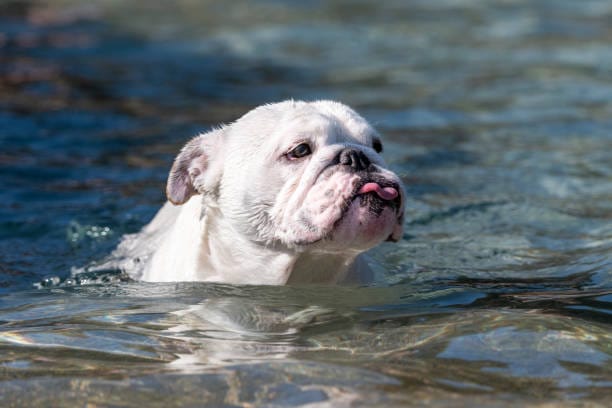If you're a dog lover, you've likely heard of the American Bulldog. With their robust build, endearing personality, and historical significance, American Bulldogs have captured the hearts of many. In this article, we'll delve into the world of American Bulldogs, exploring their origins, characteristics, care requirements, and much more.

American Bulldog Introduction
The American Bulldog is a breed that exudes strength, loyalty, and charm. Originating from the United States, this breed has a rich history and a remarkable set of attributes that make it a sought-after companion for families, individuals, and even working roles.
The American Bulldog's history can be traced back to the early American colonies. Initially used as farm dogs, they played essential roles in tasks like guarding property and herding livestock. Over the years, the breed evolved, with different types emerging to suit various purposes.
Distinctive Characteristics of the American Bulldog
The American Bulldog boasts a set of unique and remarkable characteristics that set it apart in the canine world. From its striking appearance to its endearing temperament, this breed has much to offer. Let's delve into what makes the American Bulldog truly distinctive:
1. Appearance and Physical Traits
The American Bulldog's appearance is a testament to its strength and athleticism. With a robust and muscular build, these dogs command attention wherever they go. Their broad chest, well-defined jawline, and powerful stance give them an imposing yet approachable presence.
Their coat, available in various colors and patterns, adds an extra layer of visual appeal. Whether in action or repose, the American Bulldog's physical traits showcase a breed that is both powerful and charming.
American Bulldog Weight and Size: The American Bulldog is a breed known for its impressive size and muscular build. Understanding their weight and size characteristics is necessary for providing proper care and ensuring their well-being. Let's delve into the weight and size considerations for the American Bulldog:
American Bulldogs come in various sizes, typically falling into two main categories: Standard and Classic. The Standard American Bulldog is larger and more robust, while the Classic American Bulldog is slightly smaller and more agile.

Standard American Bulldog:
- Height: Males usually stand between 22 to 28 inches (56 to 71 cm) at the shoulder.
- Weight: Males typically weigh between 70 to 120 pounds (32 to 54 kg).
- Height: Females generally have a height range of 20 to 26 inches (51 to 66 cm).
- Weight: Females typically weigh between 60 to 100 pounds (27 to 45 kg).
Classic American Bulldog:
- Height: Males typically stand between 20 to 24 inches (51 to 61 cm) at the shoulder.
- Weight: Males usually weigh between 60 to 100 pounds (27 to 45 kg).
- Height: Females generally have a height range of 18 to 22 inches (46 to 56 cm).
- Weight: Females typically weigh between 50 to 90 pounds (23 to 41 kg).
2. Temperament and Behaviour
Beneath the impressive exterior lies a heartwarming temperament that endears the American Bulldog to many. Known for their loyalty and devotion, these dogs form strong bonds with their families. Their gentle and protective nature makes them excellent companions, especially in households with children.
While their history traces back to working roles, modern American Bulldogs have seamlessly transitioned into loving family members. Their adaptable and affectionate behavior is a testament to their versatility and ability to thrive in various environments.
Different Types of American Bulldogs
The American Bulldog comes in different types, each with its distinct characteristics and attributes. These variations have arisen over time to fulfill specific roles and preferences. Let's explore the two main types of American Bulldogs:
1. Johnson Type
The Johnson American Bulldog is recognized for its larger frame and impressive strength. These dogs are often associated with working roles that require power and endurance. With a sturdy build and a resolute demeanor, the Johnson type excels in tasks that demand physical prowess. Their loyalty and protective nature also make them reliable companions for families seeking a devoted four-legged friend.
2. Scott Type
In contrast, the Scott American Bulldog showcases a more agile and athletic physique. Known for their energy and versatility, Scott types are often favored in roles that demand agility and quick thinking. These dogs are well-suited for active individuals or families who engage in outdoor activities and play. With their boundless enthusiasm and zest for life, the Scott-type American Bulldog is a spirited companion that brings joy and vitality to any household.
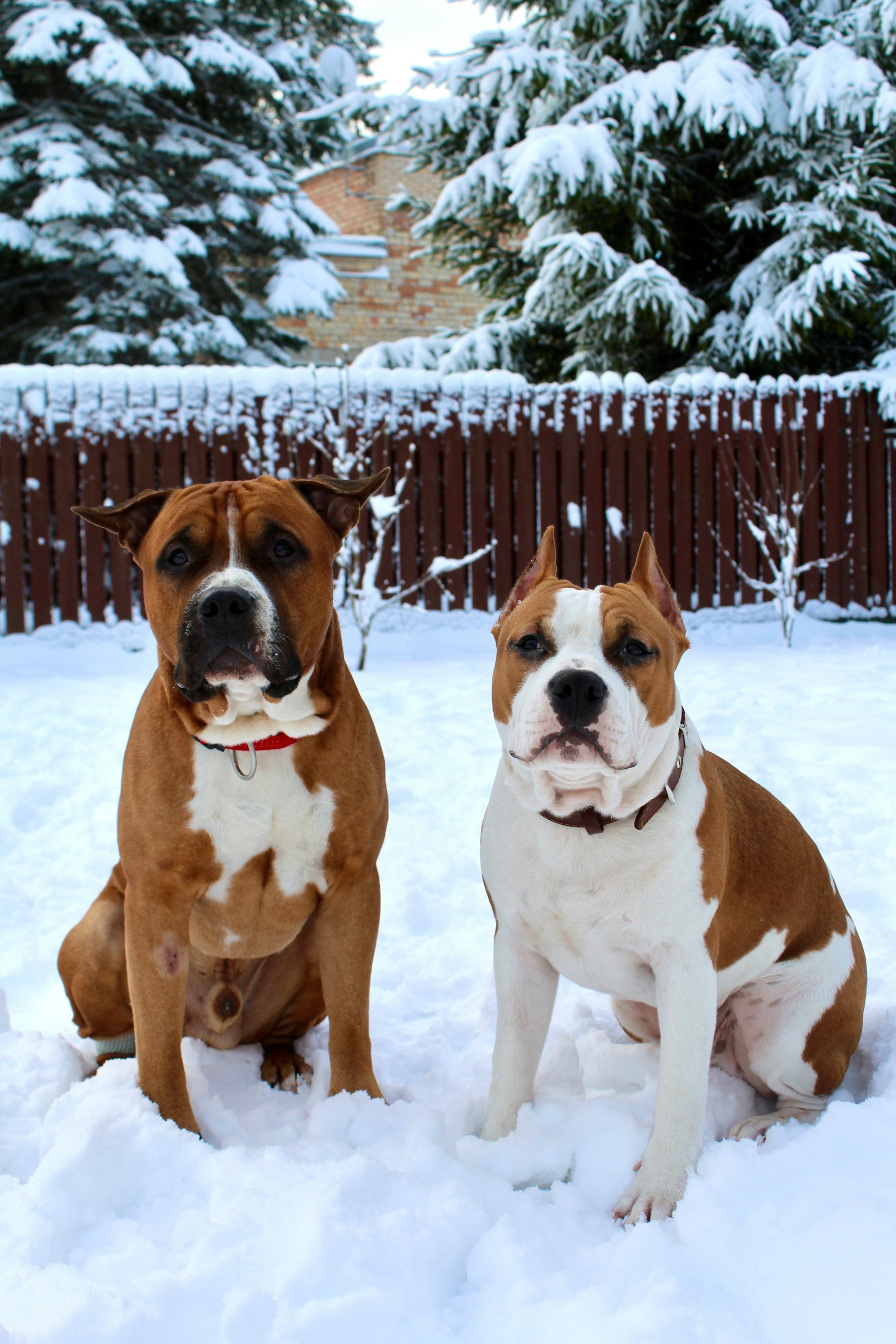
Caring for Your American Bulldog
Caring for an American Bulldog involves more than just providing the basics. These wonderful companions deserve proper attention, care, and love to lead happy and healthy lives. Let's explore the essential aspects of caring for your American Bulldog:
1. Diet and Nutrition
A well-balanced diet is the foundation of your American Bulldog's health and vitality. Consult with your veterinarian to determine the appropriate type and amount of food based on factors such as age, weight, activity level, and any specific dietary needs. High-quality dog food that is rich in protein, vitamins, and minerals will help maintain their energy levels, support growth, and keep their coat shiny and healthy.
2. Exercise and Activity
American Bulldogs are active and energetic dogs that thrive on physical activity. Regular exercise not only keeps them physically fit but also mentally stimulated. Engage in daily walks, play sessions, and interactive games to prevent boredom and ensure their well-being. Exercise not only strengthens their muscles but also fosters a strong bond between you and your furry friend.
3. Grooming and Coat Care
Despite their short coat, American Bulldogs still require regular grooming to keep their skin and coat in top condition. Brush your dog's coat at least once a week to remove loose hair and prevent matting. Trim their nails regularly to prevent overgrowth and discomfort. Dental care is also significant, so make sure to brush their teeth and provide dental chews to maintain oral health.
4. Health and Veterinary Care
Routine veterinary visits are crucial to monitor your American Bulldog's health and catch any potential issues early on. Keep up with vaccinations, parasite prevention, and dental check-ups. Discuss with your veterinarian about preventive measures specific to American Bulldogs, such as addressing breed-related health concerns like hip dysplasia.
5. Mental Stimulation and Training
American Bulldogs are intelligent dogs that thrive on mental stimulation. Engage their minds with puzzle toys, obedience training, and interactive play. Training sessions not only improve their behavior but also strengthen the bond between you and your dog. Positive reinforcement techniques work best, as these dogs respond well to praise and treats.
6. Socialization and Interaction
Proper socialization is vital to ensure your American Bulldog is comfortable around people, other dogs, and various environments. Introduce them to different situations, sounds, and people from a young age. Positive interactions and exposure help prevent behavioral issues and ensure a well-adjusted and confident dog.
7. Safety and Comfort
Create a safe and comfortable environment for your American Bulldog at home. Provide a cozy and designated sleeping area, preferably with a comfortable bed. Ensure that your home is dog-proofed, with no harmful substances within reach. Supervise outdoor activities and walks to keep them safe from potential hazards.

Training and Socialization
1. Basic Commands and Obedience Training
Training your American Bulldog is not only a means of instilling good behavior but also a way to strengthen the bond between you and your furry companion. Basic commands like sit, stay, and come are foundational and should be taught early.
2. Socialization with People and Other Pets
Proper socialization from a young age is crucial to ensure that your American Bulldog is comfortable around people and other animals. Positive interactions will contribute to a well-adjusted and friendly dog.
Health Considerations
1. Common Health Issues
Like all breeds, American Bulldogs are prone to certain health issues. These may include hip dysplasia, skin allergies, and certain eye conditions. Regular veterinary check-ups can help catch potential problems early.
2. Preventive Measures
Maintaining a healthy lifestyle, providing a balanced diet, regular exercise, and staying up-to-date with vaccinations are key steps in preventing potential health issues in American Bulldogs.
Can American Bulldogs Give Birth Naturally?
Yes, American Bulldogs can give birth naturally, but it requires careful monitoring and preparation. Like many large breeds, American Bulldogs can experience complications during labor, so it's important to be aware of the potential challenges. Natural birth is possible and often successful, but it's crucial to ensure the health and safety of both the mother and her puppies.
During pregnancy, regular veterinary check-ups are essential to monitor the health of the mother and the development of the puppies. The vet can provide guidance on diet, exercise, and any necessary supplements to support a healthy pregnancy. As the due date approaches, create a comfortable and quiet whelping area where the mother can give birth.
Signs that labor is imminent include restlessness, nesting behavior, and a drop in body temperature. During labor, the mother should be closely observed for any signs of distress or difficulty. While many American Bulldogs can give birth naturally without issues, complications such as dystocia (difficult labor) may arise, requiring veterinary intervention.
It's advisable to have an emergency plan in place and the contact information of a vet who can assist if complications occur. With proper care, preparation, and monitoring, American Bulldogs can successfully give birth naturally.
Can American Bulldogs Eat Chicken?
Yes, American Bulldogs can eat chicken, and it can be a nutritious part of their diet. Chicken is a good source of protein, essential amino acids, and other nutrients that are beneficial for your dog's overall health. However, there are a few important guidelines to follow when feeding chicken to your American Bulldog:
- Cooked Chicken: Always serve cooked chicken to your dog. Raw chicken can carry harmful bacteria like Salmonella, which can cause food poisoning.
- Boneless Chicken: Remove all bones before feeding chicken to your dog. Cooked bones can splinter and cause choking or internal injuries.
- Plain Chicken: Avoid seasoning the chicken with spices, garlic, onions, or other additives that can be harmful to dogs. Plain, boiled, or baked chicken is the best option.
- Balanced Diet: While chicken can be a healthy addition, it should not be the only component of your dog's diet. Ensure that your American Bulldog has a balanced diet that includes a variety of protein sources, vegetables, and grains, either through high-quality commercial dog food or a carefully planned homemade diet.
- Allergies: Monitor your dog for any signs of allergies or adverse reactions when introducing chicken to their diet. Symptoms of a food allergy can include itching, digestive upset, or skin problems.
By following these guidelines, you can safely include chicken in your American Bulldog's diet, providing them with a tasty and nutritious treat.

Are American Bulldog Puppies Hyper?
Yes, American Bulldog puppies are generally quite energetic and can be considered hyper. Like most puppies, they have high energy levels and a natural curiosity that drives them to explore their environment and engage in various activities. This behavior is a normal part of their development and is essential for their physical and mental growth.
Here are some reasons why American Bulldog puppies may seem hyper:
- High Energy Levels: Puppies, in general, have more energy than adult dogs, and American Bulldogs are no exception. They need plenty of physical activity to burn off this energy.
- Curiosity and Exploration: Puppies are naturally curious and love to explore their surroundings, which can make them seem hyperactive as they run around and investigate new things.
- Playfulness: American Bulldog puppies are playful and enjoy engaging in games and interactions with their owners and other dogs. This playfulness is a critical part of their socialization and development.
- Need for Stimulation: Puppies require mental and physical stimulation to keep them engaged and prevent boredom. Without enough stimulation, they may exhibit hyperactive behavior as a way to entertain themselves.
To manage their energy and help them develop into well-behaved adult dogs, it's important to provide American Bulldog puppies with regular exercise, structured playtime, and proper training. Activities like walks, play sessions, and interactive toys can help channel their energy in positive ways. Additionally, consistent training and socialization will help them learn appropriate behavior and develop good manners as they grow.
Can American Bulldogs Be Service Dogs?
Yes, American Bulldogs can be service dogs, although they are not typically the first breed that comes to mind for this role. Their strength, loyalty, and protective nature make them suitable for specific service tasks such as mobility assistance and providing emotional support. These dogs are intelligent and trainable, allowing them to perform tasks like fetching items, opening doors, and alerting their owners to potential dangers. However, training an American Bulldog for service work requires dedication, early socialization, and consistent reinforcement to ensure they develop the necessary skills and behavior for their service role.
Can American Bulldogs Be Left Alone?
American Bulldogs can be left alone, but they require proper preparation and training to handle solitude well. This breed is known for its strong bond with its owners and may experience separation anxiety if left alone for long periods. It's essential to gradually accustom American Bulldogs to being alone, starting with short periods and slowly increasing the duration. Providing them with engaging toys, ensuring they get plenty of exercise before being left alone, and creating a comfortable space can help mitigate anxiety and destructive behavior. While American Bulldogs can manage being alone for a few hours, it's crucial to balance this with ample social interaction and mental stimulation.
Are American Bulldogs Aggressive?
American Bulldogs are not inherently aggressive, but their temperament can be influenced by genetics, training, socialization, and environment. Typically loyal and protective, they may be wary of strangers, which can sometimes be mistaken for aggression. Early socialization and consistent, positive reinforcement training are crucial to help them develop into well-rounded and confident dogs. Regular exercise and mental stimulation are also essential to prevent boredom and ensure their well-being. Properly raised and trained, American Bulldogs can be affectionate, loyal, and well-behaved companions.
Can American Bulldogs Fly on Airplanes?
American Bulldogs can fly on planes, but there are several important considerations to ensure a safe and comfortable journey. Firstly, you must check with the airline regarding their specific pet travel policies, as not all airlines allow large breeds like American Bulldogs in the cabin. Typically, larger dogs must travel in the cargo hold, which can be stressful for them.
Before flying, it's crucial to prepare your American Bulldog for the experience. This includes getting them accustomed to their travel crate, ensuring the crate meets airline regulations, and making sure your dog is in good health, as verified by a veterinarian. You may also need to provide a health certificate. Additionally, consider booking a direct flight to minimize travel time and reduce the stress on your pet.
Proper hydration, a comfortable crate, and some familiar items like a favorite blanket or toy can help ease your American Bulldog's journey. Remember to avoid sedating your dog unless specifically advised by your vet, as this can pose health risks during the flight. With the right preparation and care, American Bulldogs can safely travel by plane.
Choosing the Right American Bulldog for You
Selecting the perfect American Bulldog to join your family is an exciting endeavor, but it requires careful consideration to ensure a harmonious match. Each American Bulldog has its unique personality and traits, so finding the one that aligns with your lifestyle and preferences is essential. Here's a guide to help you make the right choice:
1. Assess Your Lifestyle
Before bringing an American Bulldog into your home, take a close look at your lifestyle. Consider factors such as your daily routine, activity level, and living situation. American Bulldogs thrive in environments where they receive ample exercise, mental stimulation, and companionship. If you lead an active lifestyle and can dedicate time to play exercise, and training, an American Bulldog might be a great fit.
2. Size and Space
Consider the size of your living space. American Bulldogs can adapt to both apartment living and larger homes with yards, but ensure you have enough space for them to move around comfortably. A larger space with outdoor access can be beneficial for an American Bulldog to burn off energy.

3. Energy Level
American Bulldogs are energetic dogs that require regular physical activity. If you're an active individual or family that enjoys outdoor activities like jogging, hiking, or playing fetch, an American Bulldog can be a wonderful companion. However, if your lifestyle is more sedentary, you'll need to commit to providing sufficient exercise and mental engagement for your furry friend.
4. Socialization and Training
American Bulldogs are social animals that thrive on human interaction and positive experiences with other dogs and people. Commit to proper socialization and training from an early age to ensure a well-behaved and well-adjusted dog. If you have the time and patience to train and socialize your American Bulldog, they will reward you with loyalty and companionship.
5. Grooming and Care
Consider the grooming needs of the American Bulldog. While they have short coats, they do shed, and regular brushing will help manage their coat and minimize shedding. Additionally, be prepared for routine care such as nail trimming, dental hygiene, and regular veterinary check-ups.
6. Temperament Match
American Bulldogs have diverse personalities within the breed. Some may be more laid-back and gentle, while others might have a more energetic and playful nature. Spend time interacting with different American Bulldogs to gauge their temperament and find the one that resonates with your personality and preferences.
7. Responsible Breeding
When choosing an American Bulldog, opt for a reputable breeder who prioritizes the health and well-being of the dogs. Responsible breeding practices contribute to producing healthy, well-adjusted puppies with good genetic backgrounds.
Choosing the right American Bulldog for you involves careful consideration of factors such as lifestyle, energy level, space, and temperament. By taking the time to evaluate your needs and researching potential companions, you can make an informed decision that leads to a lifelong, fulfilling relationship with your American Bulldog.
American Bulldogs as Family Pets
1. Interaction with Children
American Bulldogs are known for their gentle and protective nature around children. However, proper supervision and training are essential to ensure a harmonious relationship between your happy dog and the kids.
2. Adaptability to Home Environment
These dogs can thrive in a variety of living situations, whether in a spacious house with a yard or an apartment with regular outdoor exercise. Their adaptability makes them suitable for various households.
Conclusion
In conclusion, the American Bulldog is a captivating breed with a storied history and a heartwarming temperament. From their impressive physical attributes to their loyal and affectionate behaviour, they bring joy to countless households. If you're considering adding an American Bulldog to your family, remember that a commitment to proper care, training, and love will result in a lifelong companionship filled with happiness.
FAQs
Q1. Are American Bulldogs good with children?
American Bulldogs are known for their gentle and protective nature around children. Proper supervision and training are essential to ensure a safe interaction.
Q2. Do American Bulldogs require a lot of exercise?
Yes, American Bulldogs are energetic dogs that require regular exercise to stay healthy and happy. Daily walks and playtime are recommended.
Q3. Are American Bulldogs prone to health issues?
Like all breeds, American Bulldogs can have certain health issues. Regular veterinary check-ups, a balanced diet, and preventive measures can help mitigate these risks.
Q4. Can American Bulldogs live in apartments?
Yes, American Bulldogs can adapt to apartment living as long as they receive sufficient exercise and outdoor activity.
Q5. Are American Bulldogs aggressive?
No, American Bulldogs are not inherently aggressive. With proper training, socialization, and care, they can be friendly and well-behaved companions.
Q6. Is an American Bulldog a Pitbull?
No, The American Bulldog and the breeds classified as Pitbulls may look similar at a glance, but differences exist.
Other American Bulldog related articles you may enjoy:
